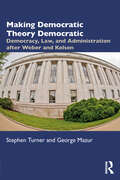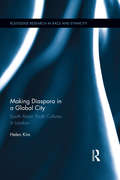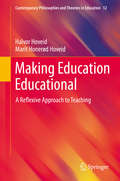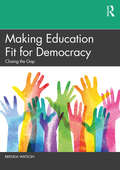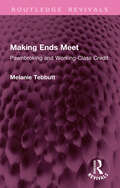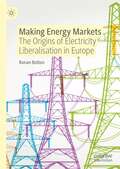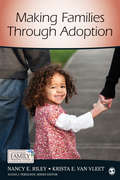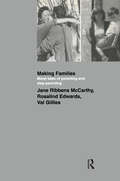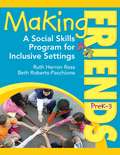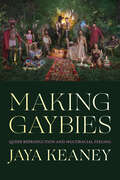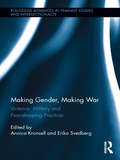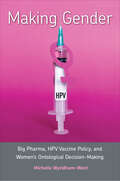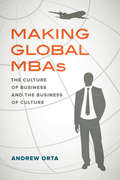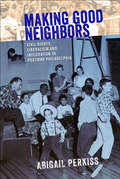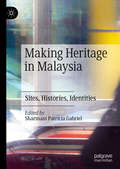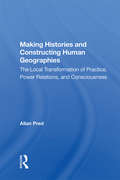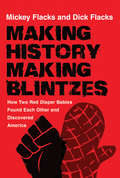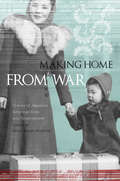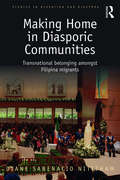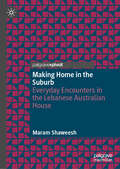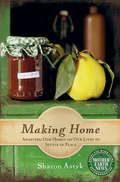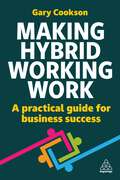- Table View
- List View
Making Democratic Theory Democratic: Democracy, Law, and Administration after Weber and Kelsen
by Stephen Turner George MazurThis book addressees a timely and fundamental problematic: the gap between the aims that people attempt to realize democratically and the law and administrative practices that actually result. The chapters explain the realities that administration poses for democratic theory. Topics include the political value of accountability, the antinomic character of political values, the relation between ultimate ends and the intermediate ends that are sought by constitutions, and a reconsideration of the meaning of the rule of law itself. The essays are inspired by the demystifying realism of Max Weber and Hans Kelsen, including explications of their views on law, constitutions, and the rule of law. The book will be of interest to social and political theorists, philosophers of law, and legal theorists, and for discussions of democratic theory, the administrative state, constitutionalism, and justice, as well as to readers of Weber and Kelsen.
Making Diaspora in a Global City: South Asian Youth Cultures in London (Routledge Research in Race and Ethnicity #10)
by Helen KimThe exciting diasporic sounds of the London Asian urban music scene are a cross-section of the various genres of urban music that include bhangra "remix," R&B and hip hop styles, as well as dubstep and other "urban" sample-oriented electronic music. This book brings together a unique analysis of urban underground music cultures in exploring just how members of this "scene" take up space in "super-diverse" London. It provides a fresh perspective on the creativity of British South Asian youth culture, and makes a significant sociological intervention into this area by bringing the focus back onto urgent issues of "race" ethnicity alongside class and gender within youth cultural studies.
Making Early Medieval Societies
by Kate Cooper Conrad Leyser Cooper, Kate and Leyser, ConradMaking Early Medieval Societies explores a fundamental question: what held the small- and large-scale communities of the late Roman and early medieval West together, at a time when the world seemed to be falling apart? Historians and anthropologists have traditionally asked parallel questions about the rise and fall of empires and how societies create a sense of belonging and social order in the absence of strong governmental institutions. This book draws on classic and more recent anthropologists' work to consider dispute settlement and conflict management during and after the end of the Roman Empire. Contributions range across the internecine rivalries of late Roman bishops, the marital disputes of warrior kings, and the tension between religious leaders and the unruly crowds in western Europe after the first millennium - all considering the mechanisms through which conflict could be harnessed as a force for social stability or an engine for social change.
Making Education Educational: A Reflexive Approach to Teaching (Contemporary Philosophies and Theories in Education #12)
by Halvor Hoveid Marit Honerød HoveidThis book is an argument for reflexivity in the act of teaching, which means to acknowledge that intention guides the act of teaching. Teaching must create attention towards processes of collectivity in the classroom. Today, teaching is both acts of expressing knowledge and acts of securing justice to all students through a mediation of knowledge. Teaching therefore expresses both knowledge with reference to school subjects, and justice according to the distribution of this knowledge.The authors argue for teaching as the driver of education. To pay attention to teaching is to pay attention to that which is inside the system of education. To consider education as a mediation of knowledge between generations, places teaching as an act of performing the content of education, in a class in a school. The complexity of these processes is easily overlooked when education is used as a means in competitive economies. The approach taken in this text is that deliberations about teaching must be based on historicity. The support for this argument builds on a reading of the French philosopher Paul Ricoeur.The book addresses teaching as an integral part of the learning process. In education today, everything seems to be concentrated around learning, as if teaching no longer takes place. Teachers and teacher educators need a language to discuss and understand teaching, both as personal and institutional actions. A Ricoeurian approach to a discussion on teaching as a reflexive and institutional practice, provides a timely approach to important questions related to teaching in our day and age.
Making Education Fit for Democracy: Closing the Gap
by Brenda WatsonDewey wrote his celebrated book on Democracy and Education over a hundred years ago. Making Education Fit for Democracy asks why education has nevertheless failed to deliver such crucial support for democracy and how it should change to reflect ethical and social responsibilities. It seeks to shed light on what has gone wrong and how it can be put right. Reforming an antiquated system of education should be a matter for public debate. This book is written not only for those currently involved in delivering education, but also for the general public. Arguing that education needs to be holistic, encouraging open-mindedness and developing a wide range of interests, it: Highlights the role of education in supporting democracy Promotes nurture in civilising values over mere information-giving Puts exams and accountability into perspective Seeks to bridge the gulf between schooling and life Argues for the reform of the whole system of education Seeks to use digital technology to personalise education Touching upon several issues currently under debate, such as the rise of populism, the role of religion and narrow subject curriculum, this book will be of interest to all students studying education as well as those involved in teacher education.
Making Ends Meet: Pawnbroking and Working-Class Credit (Routledge Revivals)
by Melanie TebbuttOriginally published in 1983, this book filled a gap in the existing literature, because the effect of credit upon a family’s real income was frequently omitted in studies of living standards. The book highlights daily routines and relationships which would otherwise remain hidden, using interviews with pawnbrokers, credit personnel and their customers in the Manchester and Salford areas of the UK. These supplement unusual documentary sources such as pledge records from the inter-war years which suggest how sensitive a barometer the trade was of working-class poverty or prosperity.The pawnshop epitomized the economic dependence of women, whose critical role in domestic management and credit organization is a key theme. Yet indebtedness became the fulfilment of a damning sexual stereotype. Insecurity of income and the physical conditions of life combined to produce a distinct set of values, of which pawning was a central part. At a time when the cost-of-living crisis is affecting the global population, and pawnbroking in the UK is on the increase, this book has an enduring relevance.
Making Energy Markets: The Origins of Electricity Liberalisation in Europe
by Ronan BoltonMaking Energy Markets charts the emergence and early evolution of electricity markets in western Europe, covering the decade from the late 1980s to the late 1990s. Liberalising electricity marked a radical deviation from the established paradigm of state-controlled electricity systems which had become established across Europe after the Second World War. By studying early liberalisation processes in Britain and the Nordic region, and analysing the role of the EEC, the book shows that the creation of electricity markets involved political decisions about the feasibility and desirability of introducing competition into electricity supply industries. Competition introduced risks, so in designing the process politicians needed to evaluate who the likely winners and losers might be and the degree to which competition would impact key national industries reliant on cross-subsidies from the electricity sector, in particular coal mining, nuclear power and energy intensive production. The book discusses how an understanding of the origins of electricity markets and their political character can inform contemporary debates about renewables and low carbon energy transitions.
Making Families Through Adoption
by Krista E. Van Vleet Nancy E. RileyMaking Families Through Adoption provides a comprehensive look at adoption practices both in the United States and in other cultures, and a general understanding of the practices and ideology of kinship and family. The subject of adoption allows a window into discussions of what constitutes family or kin, the role of biological connectedness, oversight of parenting practices by the state, and the role of race, gender, sexuality, and socio-economic class in the building of families. While reviewing practices of and issues surrounding adoption, the authors highlight the ways these practices and discussions allow us greater insight into overall practices of kinship and family.
Making Families: Moral Tales of Parenting and Step-Parenting
by Rosalind Edwards Val Gillies Jane Ribbens McCarthyThis book goes to the heart of academic, political and popular debates, as well as professional concerns, about the nature of contemporary family life and parenting. Families are widely discussed in western societies as breaking down or as radically changing, with step-families in particular seen as evidence of such trends. In one of the first British in-depth sociological research studies for over two decades, this book provide evidence of parents' and step-parents' own understandings and experiences of their parenting in step-families. It addresses questions such as: What does it mean to be a family? Do people in step-families see themselves as making a different kind of family? Is individual happiness in a couple relationship prioritised at the expense of responsibilities towards children? Can a step-parent ever be regarded as the same as a biological mother or father? What do people in step-families do to try to make step-family life work? The book looks at how people create, understand and experience their parenting and family lives. It reveals how these understandings are rooted in a strong sense of moral responsibility, but that what such responsibility constitutes varies according to gender and social class. In particular, it draws out key theoretical implications for understanding the nature of morality, fairness and justice, and questions ideas about individualisation and the democratisation of family life. This book will be essential reading for those concerned with the study of contemporary family lives, including sociologists, social policy analysts, family therapists, professionals and practitioners. It is also relevant to those interested in contemporary morality and everyday experiences.
Making Friends PreK3: A Social Skills Program for Inclusive Settings
by Beth Roberts-Pacchione Ruth Herron RossResearch shows that a child's social and behavioral skills affect the development of cognitive and physical abilities. Set students on a path to success and have fun doing it with this newly retitled edition of the popular Wanna Play. The authors provide hundreds of activities that help children learn how to behave appropriately and make friends. Included are tools for teaching emotion regulation, team playing, and body safety to all children, making this resource ideal for use in inclusive settings. New features include: A social interaction checklist for identifying learners' strengths and weaknesses Teacher-friendly activities that can be used in small groups or with the whole class A chapter on teaching emotions and communication skillsStudents with social challenges benefit from direct instruction, and early intervention helps prevent behavior problems and pave the way to academic success. This hands-on guidebook gives teachers, counselors, behavior therapists, and caregivers a wealth of easily implemented and fun-filled ways to enhance children's skills in all areas of social interaction.
Making Gaybies: Queer Reproduction and Multiracial Feeling
by Jaya KeaneyIn Making Gaybies Jaya Keaney explores queer family making as a site of racialized intimacy. Drawing on interviews with queer families in Australia, Keaney traces the lived experiences of choice and constraint as these families seek to craft likeness with their future children and tell stories of chosen family made through love. Queer family building often involves multiracial and multicultural encounters, as intending parents take part in the global fertility industry. Keaney follows queer family making through reproductive technologies and highlights the confines of varied transnational reproductive markets and policies as well as changing formations of race, gender, sexuality, and kinship. Whether sharing the story of white gay men choosing Indian and Thai egg donors to make their surrogate-born children’s ethnicities visually distinct from their own or that of an Aboriginal lesbian and her white partner choosing a Cherokee donor from the United States to articulate a global Indigeneity, Keaney foregrounds the entwinement of reproduction, race, and affect. By focusing on queer family making, Keaney demonstrates how reproduction fosters a queer multiracial imaginary of kinship.
Making Gender, Making War: Violence, Military and Peacekeeping Practices (Routledge Advances in Feminist Studies and Intersectionality)
by Annica Kronsell Erika SvedbergMaking Gender, Making War is a unique interdisciplinary edited collection which explores the social construction of gender, war-making and peacekeeping. It highlights the institutions and processes involved in the making of gender in terms of both men and women, masculinity and femininity. The "war question for feminism" marks a thematic red thread throughout; it is a call to students and scholars of feminism to take seriously and engage with the task of analyzing war. Contributors analyze how war-making is intertwined with the making of gender in a diversity of empirical case studies, organized around four themes: gender, violence and militarism; how the making of gender is connected to a (re)making of the nation through military practices; UN SCR 1325 and gender mainstreaming in institutional practices; and gender subjectivities in the organization of violence, exploring the notion of violent women and non-violent men.
Making Gender: Big Pharma, HPV Vaccine Policy, and Women’s Ontological Decision-Making
by Michelle Wyndham-WestMaking Gender endeavours to understand how the HPV vaccine became gendered within the Canadian policy landscape – when the virus is gender blind and is linked to cancer in all genders – and how women’s experiences with this "gendered risk" have been folded into their vaccine decision-making. Drawing on ethnographic fieldwork and archival research, Michelle Wyndham-West explores the creation and circulation of gendered risk as it was deployed in pharmaceutical and policy discourses surrounding the roll-out of the HPV vaccine. The book contextualizes the background for how gendered risk was mediated by two groups of women: mothers negotiating the vaccine for their daughters in school-based immunization programs and university students who experienced frequent HPV infections. The book explores these women’s efforts to be good mothers and strong young women entering adulthood who felt vulnerable in sexual health negotiation. As a result, Making Gender reveals how vaccine decision-making took an ontological form, as an inherently social and cultural process embedded in women’s experiences.
Making Global MBAs: The Culture of Business and the Business of Culture (California Series in Public Anthropology #47)
by Andrew OrtaA generation of aspiring business managers has been taught to see a world of difference as a world of opportunity. In Making Global MBAs, Andrew Orta examines the culture of contemporary business education, and the ways MBA programs participate in the production of global capitalism through the education of the business subjects who will be managing it. Based on extensive field research in several leading US business schools, this groundbreaking ethnography exposes what the culture of MBA training says about contemporary understandings of capitalism in the context of globalization. Orta details the rituals of MBA life and the ways MBA curricula cultivate both habits of fast-paced technical competence and “softer” qualities and talents thought to be essential to unlocking the value of international cultural difference while managing its risks. Making Global MBAs provides an essential critique of neoliberal thinking for students and professionals in a wide variety of fields.
Making Good Neighbors: Civil Rights, Liberalism, and Integration in Postwar Philadelphia
by Abigail PerkissIn the 1950s and 1960s, as the white residents, real estate agents, and municipal officials of many American cities fought keep African Americans out of traditionally white neighborhoods, Philadelphia’s West Mount Airy became one of the first neighborhoods in the nation where residents came together around a community-wide mission toward intentional integration. As West Mount Airy experienced transition, homeowners fought economic and legal policies that encouraged white flight and threatened the quality of local schools, seeking to find an alternative to racial separation without knowing what they would create in its place. In Making Good Neighbors, Abigail Perkiss tells the remarkable story of West Mount Airy, drawing on archival research and her oral history interviews with residents to trace their efforts, which began in the years following World War II and continued through the turn of the twenty-first century.The organizing principles of neighborhood groups like the West Mount Airy Neighbors Association (WMAN) were fundamentally liberal and emphasized democracy, equality, and justice; the social, cultural, and economic values of these groups were also decidedly grounded in middle-class ideals and white-collar professionalism. As Perkiss shows, this liberal, middle-class framework would ultimately become contested by more militant black activists and from within WMAN itself, as community leaders worked to adapt and respond to the changing racial landscape of the 1960s and 1970s. The West Mount Airy case stands apart from other experiments in integration because of the intentional, organized, and long-term commitment on the part of WMAN to biracial integration and, in time, multiracial and multiethnic diversity. The efforts of residents in the 1950s and 1960s helped to define the neighborhood as it exists today.
Making Hate a Crime: From Social Movement to Law Enforcement
by Valerie Jenness Ryken GrattetIn Making Hate a Crime Valerie Jenness and Ryken Grattet show how the concept of hate crime emerged and evolved over time, as it traversed the arenas of American politics, legislatures, courts, and law enforcement. In the process, violence against people of color, immigrants, Jews, gays and lesbians, women, and persons with disabilities has come to be understood as hate crime, while violence against other vulnerable victims-octogenarians, union members, the elderly, and police officers, for example-has not.
Making Hay
by Verlyn KlinkenborgMaking Hay gives us an unforgettable glimpse of everyday life on the family farms of northwestern Iowa, southwestern Minnesota, and Montana's Big Hole Valley. Klinkenborg evokes a way of life at risk, and weaves an unforgettable story of the richness of rural living.
Making Heritage in Malaysia: Sites, Histories, Identities
by Sharmani Patricia GabrielThis book offers a scholarly perspective on heritage as a discourse, concept and lived experience in Malaysia. It argues that heritage is not a received narrative but a construct in the making. Starting with alternative ways of “museumising” heritage, the book then addresses a broad range of issues involving multicultural and folklore heritage, the small town, nostalgia and the environment, and transnationalism and cosmopolitanism. In so doing it delivers an intervention in received ways of talking about and “doing” heritage in academic as well as state and public discourse in Malaysia, which are largely dominated by perspectives that do not sufficiently engage with the cultural complexities and sociopolitical implications of heritage. The book also critically explores the politics and dynamics of heritage production in Malaysia to contest “Malaysian heritage” as a stable narrative, exploring both its cogency and contingency, and builds on a deep engagement with a non-western society in the service of “provincialising” critical heritage studies, with the broader goal of contributing to Malaysian studies.
Making Histories And Constructing Human Geographies: The Local Transformation Of Practice, Power Relations, And Consciousness
by Allan PredThis book is intended to acquaint American historians, anthropologists, and sociologists with a discourse that questions the prioritizing of the temporal over the spatial-the historical over the geographical. Allan Pred argues that neither the study of history nor the execution of social or cultural analysis can be divorced from human-geographical
Making History / Making Blintzes: How Two Red Diaper Babies Found Each Other and Discovered America
by Mickey Flacks Dick FlacksMaking History/Making Blintzes is a chronicle of the political and personal lives of progressive activists Richard (Dick) and Miriam (Mickey) Flacks, two of the founders of Students for a Democratic Society (SDS). As active members of the Civil Rights movement and the anti-Vietnam War movement in the 1960s, and leaders in today’s social movements, their stories are a first-hand account of progressive American activism from the 1960s to the present. Throughout this memoir, the couple demonstrates that their lifelong commitment to making history through social activism cannot be understood without returning to the deeply personal context of their family history—of growing up “Red Diaper babies” in 1950s New York City, using folk music as self-expression as adolescents in the 1960s, and of making blintzes for their own family through the 1970s and 1980s. As the children of immigrants and first generation Jews, Dick and Mickey crafted their own religious identity as secular Jews, created a critical space for American progressive activism through SDS, and ultimately, found themselves raising an “American” family.
Making Home From War: Stories of Japanese American Exile and Resettlement
by Brian DempsterMany books have chronicled the experience of Japanese Americans in the early days of World War II, when over 120,000 persons of Japanese ancestry, two-thirds of whom were American citizens, were taken from their homes along the West Coast and imprisoned in concentration camps. When they were finally allowed to leave, a new challenge faced them—how do you resume a life so interrupted? For most, going home meant learning to live in a hostile, racist environment. Some returned to find they had lost their homes and had little choice but to bide their time in transitional housing, including community halls, churches, housing projects, and tent camps. Their employment options were also limited; they often worked as domestics, dishwashers, and field laborers to help support their families. The effects of these experiences reverberate to this day, and Making Home from War reaches into the past, melds together what was once hidden, and tells the often neglected or hushed story of what happened after the war. <P><P>With honesty and an eye for detail, Making Home from War is the long-awaited sequel to the award-winning From Our Side of the Fence. Written by twelve Japanese American elders who gathered regularly at the Japanese Cultural and Community Center of Northern California, Making Home from War is a collection of stories about their exodus from concentration camps into a world that in a few short years had drastically changed. In order to survive, they found the resilience they needed in the form of community, and gathered reserves of strength from family and friends. Through a spectrum of conflicting and rich emotions, Making Home from War demonstrates the depth of human resolve and faith during a time of devastating upheaval.
Making Home in Diasporic Communities: Transnational belonging amongst Filipina migrants (Studies in Migration and Diaspora)
by Diane Sabenacio NitithamMaking Home in Diasporic Communities demonstrates the global scope of the Filipino diaspora, engaging wider scholarship on globalisation and the ways in which the dynamics of nation-state institutions, labour migration and social relationships intersect for transnational communities. Based on original ethnographic work conducted in Ireland and the Philippines, the book examines how Filipina diasporans socially and symbolically create a sense of ‘home’. On one hand, Filipinas can be seen as mobile, as they have crossed geographical borders and are physically located in the destination country. Yet, on the other hand, they are constrained by immigration policies, linguistic and cultural barriers and other social and cultural institutions. Through modalities of language, rituals and religion and food, the author examines the ways in which Filipinas orient their perceptions, expectations, practices and social spaces to ‘the homeland’, thus providing insight into larger questions of inclusion and exclusion for diasporic communities. By focusing on a range of Filipina experiences, including that of nurses, international students, religious workers and personal assistants, Making Home in Diasporic Communities explores the intersectionality of gender, race, class and belonging. As such, it will appeal to scholars of sociology and anthropology as well as those with interests in gender, identity, migration, ethnic studies, and the construction of home.
Making Home in the Suburb: Everyday Encounters in the Lebanese Australian House
by Maram ShaweeshThis book investigates everyday life within Lebanese Australian homes, documenting how these homes integrate Lebanese Australian culture into suburban Australian life. It explores how the homemaking practices of Lebanese Australian families both influence and are influenced by the context of suburban housing in Australia. Drawing from in-depth interviews, household tours, photographic documentation, mental mapping, and historical imagery data collection, the book illuminates homemaking practices that have evolved from creating a "home away from home" to practices influenced by a unique Lebanese Australian lifestyle, rooted in the perception of Australia as their home.
Making Home: Adapting Our Homes and Our Lives to Settle in Place (Mother Earth News Books for Wiser Living)
by Sharon Astyk&“Shows us why the actions that prepare us for emergencies and energy descent are the right things to do no matter what the future brings.&” —Toby Hemenway, author of Gaia&’s Garden Other books tell us how to live the good life—but you might have to win the lottery to do it. Making Home is about improving life with the real people around us and the resources we already have. While encouraging us to be more resilient in the face of hard times, author Sharon Astyk also points out the beauty, grace, and elegance that result, because getting the most out of everything we use is a way of transforming our lives into something much more fulfilling. Written from the perspective of a family who has already made this transition, Making Home shows readers how to turn the challenge of living with less into settling for more—more happiness, more security, and more peace of mind. Learn simple but effective strategies to: · Save money on everything from heating and cooling to refrigeration, laundry, water, sanitation, cooking, and cleaning · Create a stronger, more resilient family · Preserve more for future generations We must make fundamental changes to our way of life in the face of ongoing economic crisis and energy depletion. Making Home takes the fear out of this prospect, and invites us to embrace a simpler, more abundant reality. &“Americans are born to be transient—Sharon Astyk has the prescription for dealing with that genetic disease, and building a healthy nativeness into our lives.&” —Bill McKibben, New York Times–bestselling author &“Exhaustively researched and compassionately delivered.&” —Harriet Fasenfest, author of A Householder&’s Guide to the Universe
Making Hybrid Working Work: A Practical Guide for Business Success
by Gary CooksonHybrid work is here to stay but we haven't got it right yet. To be truly effective, hybrid working must form part of the overall business strategy and work, organizational structures and teams must be designed with hybrid in mind. Making Hybrid Working Work is a practical book for senior business practitioners and people professionals wanting to ensure that hybrid working works for their people and their business. With guidance on leading, managing and developing hybrid workers, this book will help you embed hybrid working into your organization design. This book explores what hybrid means for your office real estate, how to choose the right technology for hybrid working and how to ensure you're only investing in automating the correct things. It discusses how to use data to take an evidence-based approach to solving problems in a hybrid organization and how you can support learning for hybrid workers, build a learning culture and prioritize performance, not location. With coverage of managing the hybrid employee experience with a focus on company culture, this book also includes the latest research, interviews with those who have experienced the benefits and challenges of this way of working and real-world examples from companies including Centrica, what3words and EMIS Health. Discover how to be deliberate about hybrid ways of working and not leave success to chance with this essential guide.
